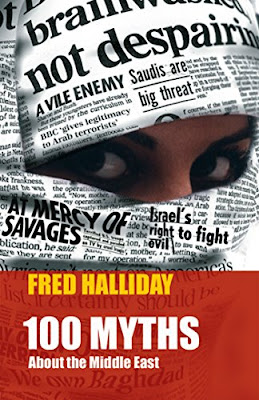“Far from the world being swept by a wave of rationality, historical accuracy and universality, the very turmoil produced by [capitalist] globalisation, by the collapse and discrediting of the dominant radical ideologies of the twentieth century, of left and right, and by a world where violence in many unexpected forms is prevalent, has led to a strengthening of myth and emotional claims. We are aware, through the work of sociologists and students of nationalism, of the role of such myths in mobilising people and enabling them to make sense of their complex and often bewildering lives. Hence we can recognise that the more rapidly the world changes, and the more interaction and conflict there are between peoples, the more potent these ideas become.”
–Fred Halliday, 100 Myths About the Middle East, 2005, pp. 14-15
Some of the myths
“The Middle East is, in some fundamental way, ‘different’ from the rest of the world and has to be understood in terms distinct from other regions.”
“The incidence of war in modern times in the Middle East is a continuation from earlier times of violence and conquest and of a culture that promotes violence.”
“The politics of the Middle East are governed by a set of rules peculiar to this region.”
“The ‘West’ has, for centuries, been hostile to ‘Islam’.”
“We live in an age when international relations are dominated by a ‘clash of civilisations’.”
“The contemporary Middle Easters states can be explained in terms of institutions, traditions and cultures derived from ‘Asiatic’, ‘Oriental despotic’ or other earlier regional forms of state… The conditions of the Arab world is to be explained by the impact of traditional values and a ‘failure’ to respond to the modern world and its norms.”
“Islam does not allow for a separation of religion and politics, and hence of what in modern European thought is termed ‘secularism’. This is evident from Islamic history, and is expressed in the Muslim saying al-Islam dinun wa dawlatun (‘Islam is a religious and political system’)
“The politics of the Middle East before and during modern times is the preserve of states, external powers and internal despotisms…”
“There are no classes in the Middle East. The concept of ‘class’,, and broader Marxist categories of social formation, world capitalist economy and the formation of exploitative states are irrelevant to understanding the region.”
“Israel is not a colonial or settler state.”
“The history of World War I and its aftermath in the Middle East demands understanding the importance of the British official T. E. Lawrence, often known as ‘Lawrence of Arabia’.
“Contemporary political and social developments can only be understood by reference to ancient, centuries-old—if not millennia-old—conflicts: the Medes and the Persians; the sons of Abrahams; the desert (‘brown’) and the fertile (‘green’); the sons of Adnan and of Qantan; Sunnis and Shi’is [sic]; the followers of Yezid or Mu’awiya versus those of Hussein and Ali … to name but a few.”
“The people’s, and states, of the [Middle East] region have been more or less at war for hundreds, perhaps thousands, of years.”
“The religions of the Middle East—notably Islam, Christianity, Judaism—are, if their holy texts are consulted, ‘religions of peace.”
“Alternatively, the religions of the Middle East are ‘religions of war’.”
“The behaviour of Middle Eastern states and peoples can be explained by reference to the prescriptions of a set of holy texts.”
“The problem with Islam is that it is in need of a ‘Reformation’.”
“Muslims of the Middle East have, for religious reasons, a particular resistance to rule by or substantive interaction with non-Muslims.”
“Islam forbids alcohol”
Since 2005, more myths have been recycled and new ones have sprung. ‘The Muslim threat’, “they hate us’, ‘sectarianism’, ‘Western values’, ‘our way of life’, ‘identity politics’, the rewriting of national histories … and an array of conspiracy theories.

Comments